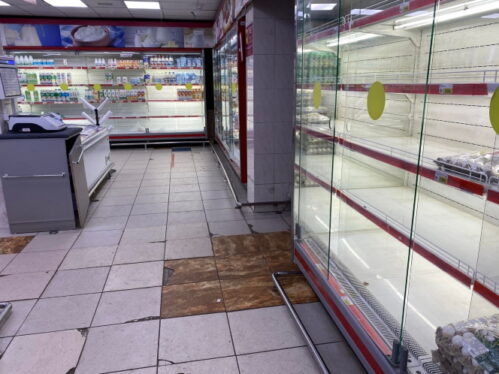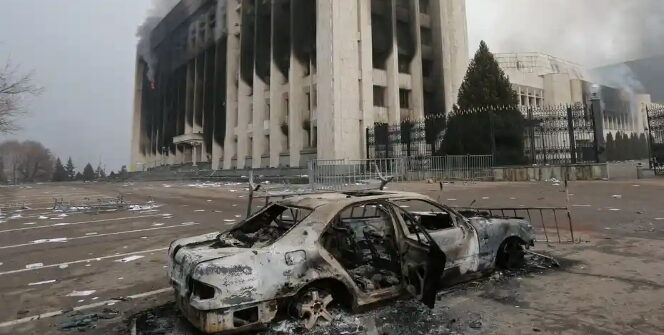TECH NEWS – The Kazakh uprising/coup attempt that began in early January demonstrates with poignant authenticity the consequences of “shutting down” the internet in a modern society…
The ball is in Kazakhstan’s court: a wave of protests, initially sparked in early January by the abolition of the official price of LPG (automotive gas) and a sudden spike in fuel prices, which quickly escalated into a generalised nationwide riot, has left at least 164 civilians dead and 6,000 people in custody, according to the latest reports. However, there is also a technological dimension to these tragic events: as the country is one of the most digitalised societies in the region, the internet restriction measures introduced by the regime have serious consequences, and not only in economic terms.
Food and cash shortages
According to data provider NetBlocks, around 95 per cent of Kazakhstan’s internet users have been unable to get online since 5 January. KazakhTelecom, the state-owned telecoms giant, began restricting access on 4 January amid nationwide protests over fuel prices that quickly swept through the country, long-suffering from inequality and corruption.
Many Kazakh citizens use credit cards to make their daily purchases. These are often rendered unusable by the outage, as payment terminals depend on internet connectivity. By the end of the week, long queues had formed outside ATMs in Almaty, Nur-Sultan and Aktau as residents sought cash to buy essential groceries.
Nurserik Zholbarys, a resident of Nur-Sultan, said he queued for more than 30 minutes to withdraw 10,000 tenges ($23) from an ATM machine at SberBank in the city’s fashionable Esyl district
This is the daily limit imposed on those who can find a working ATM: The National Bank suspended commercial banking services on 6 January; some fear they will not be available again until the state of emergency is lifted.
According to an economist in Nur-Sultan, the 10,000 tenge limit is effective in helping commercial banks avoid panic withdrawals.
“The internet outage showed how the nation’s economy wholly depends on it. Cashless payments went down, food supply chains were disrupted, long lines formed in supermarkets. It has sent our society back to the early 2000s,” said the economist just before his relationship was severed and before Eurasianet could ask permission to print his name.

Supermarket in Nur-Sultan on 7 January. (KZ.media/Telegram)
Residents of Almaty reported difficulty finding food as intermittent shelling continued in the city of 1.8 million, Kazakhstan’s largest city. The only thing that helps is that residents try to support each other.
Although the country’s president, Kassym-Jomart Tokayev, announced on 8 January that internet access would be partially restored in some regions of the country, there is little sign of this yet, while some analysts estimate that the loss of internet traffic has already cost the Kazakh economy more than $200 million.
Source: Eurasianet
The helpful blogger
When riots and clashes with police broke out in Kazakhstan, famous blogger Kunekei Nurlan was surprised to find that few of his foreign followers saw his stories. The blogger hadn’t noticed that the internet had been shut down across the country because of the VPN on his phone.
But most Kazakhs could not contact their loved ones or find information about what had happened: families were torn apart, relatives and friends were separated. In the midst of the crisis, friends and acquaintances stranded in airports in other countries began to contact the blogger.
“They asked me to call their friends and parents because mobile phone and landline services in Kazakhstan were working,” said Nurlan
She started receiving more and more messages on social media, not just from friends and acquaintances: “I could not physically call them all by myself anymore. I ran out of money on my phone, the bank apps and terminals did not work, and we were all sitting at home, with no one going out.”
Nurlan came up with the idea of creating a group on Telegram, one of the most popular messaging apps.
“I quickly announced that I was looking for volunteers who also had access to the internet to connect people because the worst thing is when you don’t have any information,” he said.
Kunekei Nurlan received applications from hundreds of people not only from Kazakhstan but also from other countries – Russia, Uzbekistan, Turkey and European Union member states.
Within a few days, the “Bauyrmen Bailanys” community appeared, which means “Linking with a brother” in Kazakh. At the time of writing, the Telegram channel had over 13 000 subscribers.

Kunekei Nurlan
On Friday (7 January) alone, the group received more than 3,700 requests, and volunteers managed to reach most of them.
While hardly any hard news was delivered on the first day, the situation started to change as the influx of requests began
“Today, for instance, we were contacted by medics. They said there was a man lying in a coma in the hospital and they were looking for his relatives,” said Nurlan.
The Bauyrmen Bailanys team currently has around 50 volunteers, but Nurlan says he handles the most difficult requests himself.
“It is psychologically difficult because there are all kinds of messages. Several volunteers have asked for psychological help,” said the blogger.
Source: Euronews
Bitcoin mine collapse
It’s not a well-known fact, but Kazakhstan has recently emerged as the world’s second most crucial bitcoin-producing country. However, now, due to unrest and especially internet restrictions, almost a fifth of the world’s bitcoin miners have shut down.
China was once the global powerhouse of bitcoin mining, with a 75.5 per cent market share, but government restrictions last May prompted the entire industry to move to friendlier states with cheap energy. Kazakhstan has been an attractive location for these groups because of its abundant and affordable energy, but with more than 90 per cent of the country’s power supply coming from fossil fuels, including coal, this hasn’t helped bitcoin’s already significant impact on the climate.
Kazakhstan had a market share of just 1.4 per cent in September 2019, but this had increased to 18.1 per cent by August 2021. Without internet connectivity to other miners worldwide, Kazakh mining groups could not continue to operate. That’s why now BTC.com, a cryptocurrency industry data service, says the global hash rate – a measure of computing power devoted to bitcoin mining – fell 14 per cent from Tuesday to Thursday.
Didar Bekbau, a Kazakhstani bitcoin miner, said on Twitter, “No internet, so no mining. Internet is blocked in Kazakhstan. Mobile operators, home internet, everything.”
Although miners are essential to maintain the bitcoin network, there are enough miners outside Kazakhstan to keep the cryptocurrency running in places with a working internet connection.
Source: NewScientist
















Leave a Reply